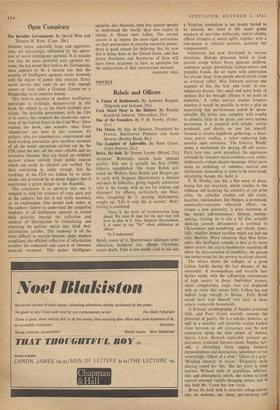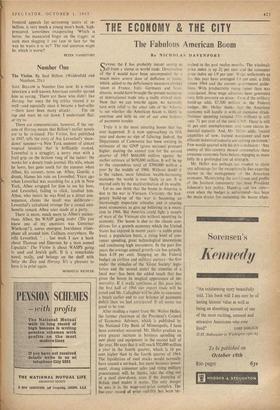NOVELS
Rebels and Officers
The Mains. By Eca de Queiroz. Translated by Patricia MacGowan Pinheiro and Anne Stevens. (Bodley Head, 30s.) Drive, He Said. By Jeremy Larner. (Blond, 21s.) ANTHONY BURGESS'S novels have unusual quality. This one is actually his first (1949), hitherto unpublished. The Army Rebels pre- ceded the Welfare State Rebels and Burgess got in early with Sergeant Quartermain, a musical anti-hero in Gibraltar, giving vaguely subversive talks to the troops, with an eye for widows and disrespect for officers, particularly one Muir, who, imagining he is quoting Shakespeare, coughs up, 'Life is real, life is earnest.' Muir- baiting is continued.
'There is the work of reconstruction lying ahead. We must fit men for the part they will have to play in it. Also, Sergeant Quartermain, it is usual to say "Sir" when addressing an officer.'
'So I understand.'
Barely aware of it, Quartermain sabotages army education, instigates riot, offends Christians, causes death. Time is not wholly kind to his tale, a Virgilian symbolism is too deeply buried to be noticed, but there is left much genial mockery of war-time militarism, tourist cliches, official attempts at moral uplift, together with a side-glance at colonial poverty, sardonic but compassionate.
Subversion has now developed in curious directions. Bishops denounce belief in God, parents cringe before bossy ignorant children, audiences accept journalistic fashion-setters and palpable frauds, the air hums with admiration for vicious thugs from people who'd shrink from an irritated rabbit. Miss Johnson satirises one segment of this, the 'sick' and 'cruel' in con- temporary drama; 'that small and noisy body of opinion that has brought silliness to the point of dementia.' A rather puritan teacher wonders whether it would be possible to write a play so nauseating that performance would be incon- ceivable. He writes one, complete with cruelty to animals, kicks in the groin, and every known perversion. It is accepted with delight, swiftly produced, and shocks no one but himself. Around it revolve highbrow gatherings, a disas- trous poetry reading, a rather endearing lady novelist aged seventeen. The Literary World' seems a mechanism for paying off old scores. Parts here may seem parochial, the aggression softened by tiresome mock-archness, cosy asides, deliberately archaic chapter-headings. Other parts make an anthology of rudeness, marital and intellectual, demanding at times to be read aloud, infuriating though this habit is.
P. H. Newby, too, has a fine sense of place, loving but not mawkish, which reaches to the wildness still haunting the outskirts of our prim cities. As suburbia crushes out old crafts, loyalties, relationships, Ian Hedges, a provincial, community-conscious education Officer, en- visages a new university, 'a great statement of the town's self-awareness.' Serious, motive- seeking, trusting, he is also a bit dim, actually thinking juvenile delinquency is confined to Christendom and wondering, not wholly fanci- fully, whether human sacrifice might not jack-up civic idealism. More laborious than Miss John- son's, this intelligent comedy is best at its more minor points: the satyric headmaster sounding off about the disassociation of sensibility, the parson too embarrassed by the services to attend church.
The Maias shows the collapse of a great Lisbon family during the last decades of the monarchy. A cosmopolitan and versatile heir battles vainly with the suffocating conventions of high society in decay. Individual careers, social complexities, tragic love are displayed with an irony that misses little. Lisbon has not bulked large enough in fiction: Felix. Kroll would have kept himself very alert in these ornate, vulnerable households.
A fictional autobiography of Sappho promises little, and Peter Green scarcely conveys the professes of poetry. He is a soholar, however, as well as a novelist, and plausibly evokes Lesbos riven between an old aristocracy and the new commerce aping the state power of Athens, Sparta, Crete. Beneath explicable political ap- pearances irrational horrors crawl. Sappho her- self, a disturbing force edging between purposefulness and destruction, sometimes writes surprisingly. 'Ghost of a wink.' Ghost of a grin.' 'Blinding intensity of vision.' Enigmatic smile playing round her lips.' But her story is what matters. Without slabs of gratuitious informa- tion and atmospheric whirls, she strives to keep control amongst rapidly-changing values, and in this field Mr. Green has few rivals.
Drive, He Said, with its anarchic college sports- star, its violence, car chase, pot-smoking and
frenzied appeals for screaming saints of re- bellion, is very much a young man's book, high- pressured. sometimes exasperating 'Which is better. the manicured finger on the trigger, or each man slugging it out face to face for the way he wants it to be?' The real question might be, which is worse?
PETER VANSITTkRT







































 Previous page
Previous page